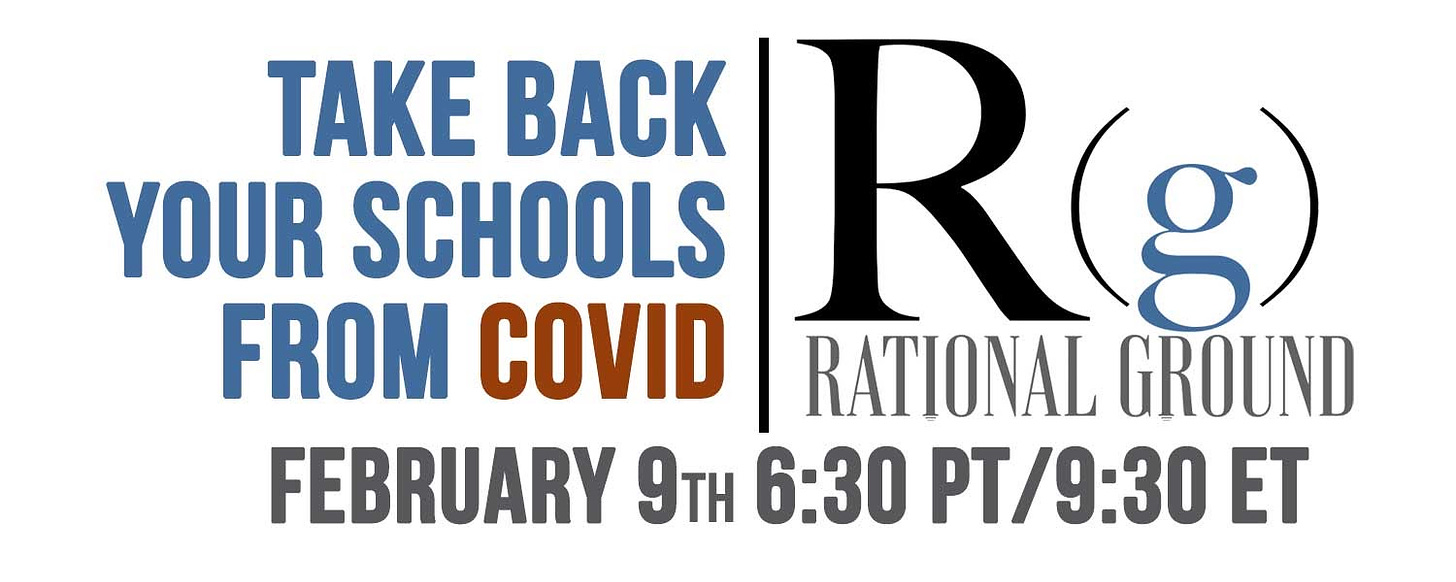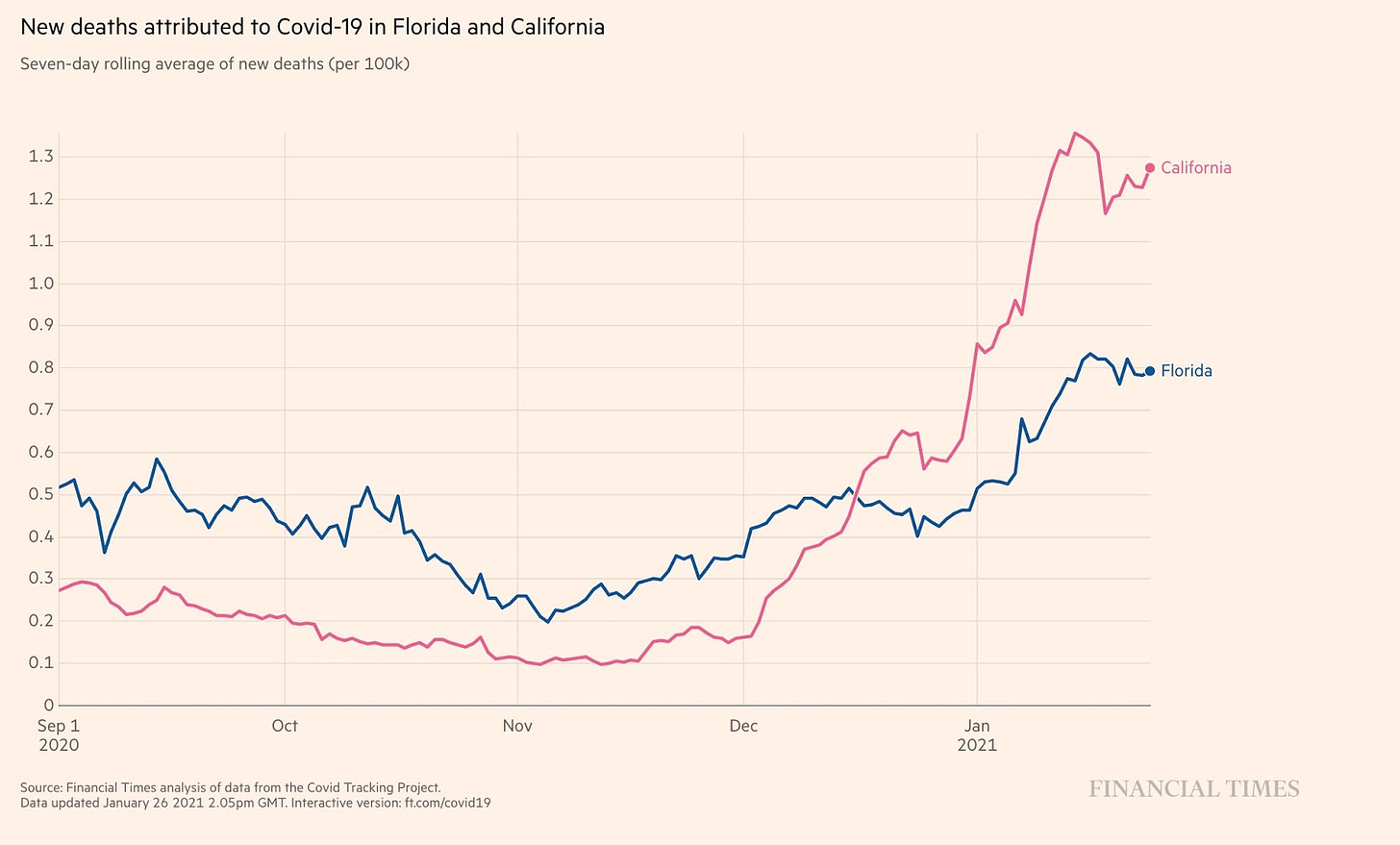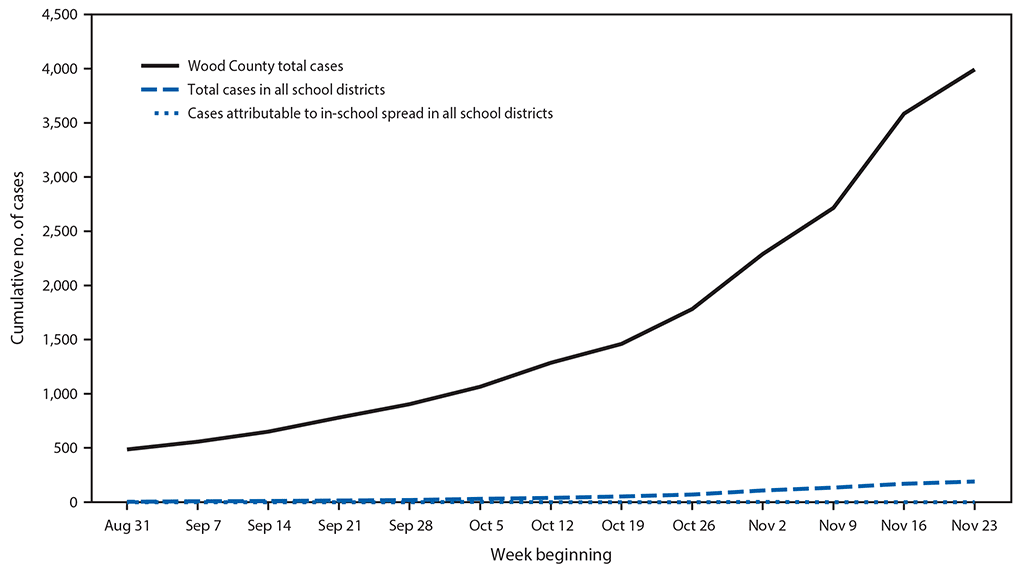In an interview with "Today," Dr. Anthony Fauci declared that two masks are better than one when it comes to slowing the spread of COVID-19. (We still don’t know of their effectiveness according to the best evidence to date).
But other experts are finally beginning to recognize deaths tied to alcohol use, drug use and suicides have risen during the pandemic—as an effect of the emotional toll of isolation.
In other news:
UPDATE: The Rational Grounds team is hosting a free webinar on Tuesday, February 9th at 9:30 pm ET/6:30 PT. We will share the tools and tactics you need to take back your school Register here.
A new Yale study shows COVID school closures most harm students from poorest neighborhoods.
In a new article for Real Clear Politics, Dr. Scott Atlas wonders if the truth about the ineffectiveness of interventions will ever be told.
Writing in The Critic, Victoria Hewson says the scientific method must allow for dissent and criticism, even for lockdowns.
More health authoritarianism: China has begun using anal swabs to test those it considers at high risk of contracting COVID.
Interested in becoming knowledgeable on COVID? Become a premium member. Our premium members get special access to our personal data dashboards and analysis.
Want to support our work? Visit our Substack page and leave us a tip.
On Rational Ground for our premium members, our data analyses will always be available to you. Interested in becoming a COVID expert? Become a premium member.
Additionally, we just released an update on how COVID-19 is playing out on university campuses.
COVID News
Fauci: Wearing two masks is better than one
https://nypost.com/2021/01/25/fauci-wearing-two-masks-is-better-than-one/
Two face masks are better than one, Dr. Anthony Fauci said Monday.
The infectious diseases specialist advised that double-masking is a logical way to curb the spread of the coronavirus.
“If you have a physical covering with one layer, you put another layer on, it just makes common sense that it likely would be more effective,” Fauci said on the “Today” show.
The White House adviser explained that face coverings prevent respiratory droplets — and the virus — from spreading to other people, as well as protecting the wearer.
They Lost Sons To Drug Overdoses: How The Pandemic May Be Fueling Deaths Of Despair
Karen Butcher's son Matthew struggled for years with an addiction to opioids. She's convinced the pandemic made it worse.
The restaurant in Scott County, Ky., where Matthew worked as a bartender closed before the pandemic, and soon other establishments, from restaurants to stores, followed suit as states imposed lockdowns.
"One day you're a bartender and you're serving people and having a great time at it, and then the next day the doors are closed," Butcher recalls. "Then COVID hits. It was the perfect storm."
Butcher says her son was increasingly isolated, just at a time when his unemployment checks were starting to come in.
COVID school closures most harm students from poorest neighborhoods
https://news.yale.edu/2021/01/05/covid-school-closures-most-harm-students-poorest-neighborhoods
Pandemic-related school closures are deepening educational inequality in the United States by severely impairing the academic progress of children from low-income neighborhoods while having no significantly detrimental effects on students from the county’s richest communities, according to a new study co-authored by Yale economist Fabrizio Zilibotti.
Using a quantitative model to examine the consequences of extended school closures for high school students, the researchers determined that children living in the poorest 20% of U.S. neighborhoods will experience the most negative and long-lasting effects of school closures. For example, their model predicts that one year of school closures will cost ninth graders in the poorest communities a 25% decrease in their post-educational earning potential, even if it is followed by three years of normal schooling. By contrast, their model shows no substantial losses for students from the richest 20% of neighborhoods.
Commentary/Analysis
Will the Truth on COVID Restrictions Really Prevail?
The consequences of the SARS2 coronavirus pandemic and its management have been enormous. Over 400,000 American deaths have been attributed to the virus; more will certainly follow. Even after almost a year, the pandemic still paralyzes our country. Despite all efforts, there has been an undeniable failure to stop cases from rapidly escalating and preventing hospitalizations and death.
Here’s the reality -- almost all states and major cities, with a handful of exceptions, have implemented severe restrictions for many months, including closures of businesses and in-person school, mobility restrictions and curfews, quarantines, limits on group gatherings, and mask mandates dating back to at least the summer. These measures did not significantly change the typical pattern or damage from the SARS2 virus. President Biden openly admitted as much in his speech to the nation on Jan. 22, when he said “there is nothing we can do to change the trajectory of the pandemic in the next several months.” Instead of rethinking the results of implemented policies, many want to blame those who opposed lockdowns and mandates for the failure of the very lockdowns and mandates that were widely implemented.
Shutting up the unspeakable is still a bad idea
https://thecritic.co.uk/shutting-up-the-unspeakable-is-still-a-bad-idea/
Are Lockdown sceptics seemingly jumping ship? Two weeks ago Alistair Haimes, an outspoken critic of the restrictions, wrote in The Spectator about his acceptance of the need for the current iteration of the national lockdown, given that the availability of vaccines puts a clear time limit on it, and the new variant seems to be putting more people than ever at risk.
Then, in a widely shared piece published in Quillette on Saturday my IEA colleague Christopher Snowdon took to task “Coronavirus cranks” for their “rebarbative and destructive” version of lockdown scepticism, and explained his own move away from resisting lockdowns after the initial effort to “flatten the curve” in March last year. But while Snowdon puts forward detailed rebuttals for the scientific claims of, in particular, Mike Yeadon and Ivor Cummins, and many people do indeed find their output to be objectionable, he fails in my view to make the case that they have been destructive. Nor am I persuaded by his or Haimes’s case that the government was right to impose this current, or any other, lockdown.
Christopher Snowdon is a valued colleague of mine at the free market thinktank where we both work. This is not an attack on him or any other of my colleagues and friends who hold similar views. I know he and they do not support restrictions on our fundamental rights and freedoms lightly (or indeed, as some have suggested, in return for money or favours), and they have good and well thought out reasons for their positions. But I fear that focusing on the controversial output of particular outspoken sceptics, and linking reasonable scrutiny of the collection and use of test data to gangs of people gathering outside hospitals shouting about hoaxes, risks discrediting scepticism about lockdown theory and policy generally. In the coming months, we will have to battle to have restrictions lifted after vulnerable populations have been vaccinated; discrediting all lockdown sceptics as dangerous cranks will not make that fight any easier and risks encouraging regulators and social media platforms, already on a hair trigger, to censor debate and dissent.
Research
When the Great Equalizer Shuts Down: Schools, Peers, and Parents in Pandemic Times
https://www.nber.org/papers/w28264
Abstract:
What are the effects of school closures during the Covid-19 pandemic on children's education? Online education is an imperfect substitute for in-person learning, particularly for children from low-income families. Peer effects also change: schools allow children from different socio-economic backgrounds to mix together, and this effect is lost when schools are closed. Another factor is the response of parents, some of whom compensate for the changed environment through their own efforts, while others are unable to do so. We examine the interaction of these factors with the aid of a structural model of skill formation. We find that school closures have a large and persistent effect on educational outcomes that is highly unequal. High school students from poor neighborhoods suffer a learning loss of 0.4 standard deviations, whereas children from rich neighborhoods remain unscathed. The channels operating through schools, peers, and parents all contribute to growing educational inequality during the pandemic.
Charts and Graphics
Reminder: Florida lifted *all* Covid-19 restrictions back in September. California has remained in lockdown all along.
CDC Wisconsin study
Community % positive was 7% to 40%. Only 191 total cases in 17 K-12 schools, only 7 (3.7%) linked to in-school transmission. Zero student to teacher transmission.
International News
China’s Zero-Tolerance Covid Tactics Now Include Anal Swabs
China is ramping up efforts to neutralize the coronavirus as new outbreaks challenge its already stringent pandemic strategy, with another weapon added to an arsenal of border curbs, mass testing and hard lockdowns: anal swabs.
While there’s no nationwide policy on use of the technique, some residents in China’s northern regions -- where more than 1,700 cases have emerged -- have been subjected to the swabs with little warning. The method involves the insertion of a saline-soaked cotton swab about two-to-three centimeters into the anus, with the sample then tested for active traces of the virus.
More than 1,000 schoolchildren and teachers in Beijing were given anal, throat and nose swabs last week, along with a separate antibody test, after one asymptomatic virus case was detected on campus, according to local officials.
How some European countries are keeping schools open
https://www.dailymail.co.uk/news/article-9184943/How-European-countries-keeping-schools-open.html
While parents in Britain face the prospect of schools staying shut until Easter, some European countries have managed to keep their classrooms open during the hard winter of Covid-19 with compulsory masks and social distancing rules.
In France, children are still attending in person at every level from kindergartens to high schools - with masks required for children aged six and up - even amid strict lockdown rules including a nationwide 6pm curfew.
Primary schools in parts of Belgium have a more elaborate system where mask rules kick in once any pupil or teacher has to go into self-isolation, with individual schools shutting altogether if there is a cluster of cases there.
In Switzerland, masks are compulsory at secondary schools and children must stay at home for 10 days if they come into contact with an infected person, but classrooms are generally still open.







I believe if the cult of the mask falls, so does all the other unscientific “mitigation” efforts. There is no other word for masking humans to this extent, especially children; but “Evil.”